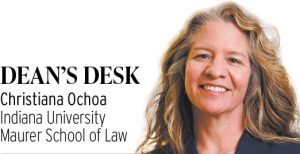Subscriber Benefit
As a subscriber you can listen to articles at work, in the car, or while you work out. Subscribe Now As dean of the Indiana University Maurer School of Law, I have the privilege of seeing how our community makes a positive impact on local, state, national, and international affairs every day.
As dean of the Indiana University Maurer School of Law, I have the privilege of seeing how our community makes a positive impact on local, state, national, and international affairs every day.
Our students—deeply involved in their studies—still find time to donate thousands of hours of pro bono service every single year. Our alumni, 12,000-plus strong, bring pride to our school and the legal profession every day. And our faculty, tasked with shaping the attorneys of tomorrow, devote extensive time inside and outside the classroom, ensuring our legacy of producing ethical, practice-ready lawyers by the time they graduate.
But our faculty do more than that. I wanted to take this opportunity to shine a spotlight on some of their recent accomplishments and how those achievements are—and will continue–making a difference in the world around us.
Earlier this year, Indiana Supreme Court Chief Justice Loretta Rush ’83 delivered the annual State of the Judiciary address to Hoosier leaders and lawmakers. One of the pillars of her excellent speech highlighted how technological proliferation can help bridge the gap between citizens and our courts.
Access to justice has long been a focal point of our law school, and I was proud to hear the chief justice cite research led by professor Victor Quintanilla and a team of Indiana University Psychological and Brain Sciences faculty.
The team’s report, “Accessing Justice with Zoom: Experiences and Outcomes in Online Civil Courts,” was one of the first reports of its kind since the pandemic. Quintanilla and his team measured the impact of remote technologies on vulnerable individuals in civil cases like evictions, debt collection, small claims and family law—cases in which more than 90 percent of defendants are unrepresented.
The report compared the experiences of unrepresented persons attending civil proceedings in person with those accessing court remotely. Their findings revealed “loudly and resoundingly: online civil courts enhance access to justice for unrepresented litigants.” While Indiana is already considered a national leader in court technology, Quintanilla’s research will help augment debates around the country on the effectiveness of using technology to make access to our courts easier and more efficient.
Across the country, a committee chaired by professor John Applegate released the final report of its five-year charge to review the analysis performed by a team investigating how best to treat and dispose of low-level waste at the Hanford Nuclear Reservation in Washington.
Applegate had led the 13-member National Academies of Sciences, Engineering, and Medicine committee since 2018. The committee’s formation and work stemmed from the storage of radioactive and other hazardous wastes at the Hanford site, where approximately two-thirds of the nation’s plutonium stockpile for nuclear weapons was produced from 1944 to 1987.
Applegate’s team evaluated the quality and completeness of the Federally Funded Research and Development Center report, which will inform the decision-making process of the U.S. Department of Energy and Congress on how to treat supplemental low-activity waste in the future.
Professor Jenn Oliva, who joined the IU law faculty last summer, is the co-investigator on a grant team aiming to understand the role of the pharmaceutical industry in propelling the current opioid crisis among veterans of the U.S. military.
The five-year, $3.1 million grant by the National Institute on Drug Abuse will examine the specific impacts of industry efforts to target military veterans as opioid consumers. The research team has noted that veterans have many vulnerabilities and are one of the populations most severely affected by the opioid crisis and opioid-related harms, including overdoses and infections.
Oliva—a U.S. Army veteran—and the researchers will produce deliverables that positively impact pain management policy, practice, and the attitudes and expectations of our nation’s veterans and others struggling with chronic pain.
Just last month Professor Amy Applegate and two other colleagues made a virtual presentation to hundreds of Canadian attorneys, mediators, and other family law professionals, briefing them on the updated Mediator’s Assessment of Safety Issues and Concerns, an intimate partner violence and/or abuse screening test the trio created in 2010. Applegate’s team shared the latest research, tips, and tools to help professionals achieve best practice standards to resolve cases involving family violence, particularly those in which there are serious safety risks and power imbalances arising from family violence.
Finally, the law school is proud to host Miguel Angel Marmolejo this spring, the first scholar to arrive in Bloomington as part of an international agreement designed to strengthen ties between Mexico and the United States.
Marmolejo is the inaugural Fulbright-Garcia Robles Chair at Indiana University, serving as a visiting professor through the spring semester. His appointment is a result of the Fulbright-COMEXUS program, established in 2016 to create new and strengthen existing ties between Mexican and American universities, faculty, and students.
Marmolejo is teaching two courses at the law school—International Environmental Law: Energy Sustainability and Commercial Arbitration—while continuing his research on justice and economic affairs derived from the Mexican Energy Reform.
Despite the vast differences in their subject areas, our faculty have several things that unite them—one of those being a deep passion for sharing their knowledge and research to make a difference in the world around us.
The faculty highlighted here are a few among the many Maurer faculty making invaluable impacts on society through their research and advocacy. To learn more, visit our website at law.indiana.edu.
__________
Christiana Ochoa is dean, professor of law and Class of 1950 Herman B Wells endowed professor at Indiana University Maurer School of Law. Opinions expressed are those of the author.
Please enable JavaScript to view this content.
